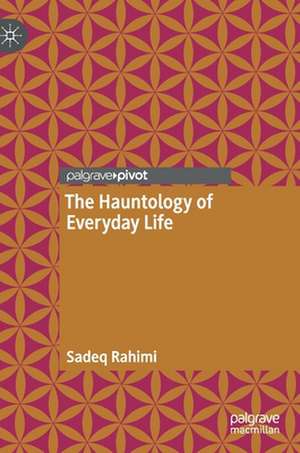The Hauntology of Everyday Life
Autor Sadeq Rahimien Limba Engleză Hardback – 19 aug 2021
Preț: 469.54 lei
Nou
Puncte Express: 704
Preț estimativ în valută:
89.87€ • 93.67$ • 74.81£
89.87€ • 93.67$ • 74.81£
Carte tipărită la comandă
Livrare economică 06-20 ianuarie 25
Preluare comenzi: 021 569.72.76
Specificații
ISBN-13: 9783030789916
ISBN-10: 3030789918
Pagini: 124
Ilustrații: XXIII, 106 p.
Dimensiuni: 148 x 210 mm
Greutate: 0.31 kg
Ediția:1st ed. 2021
Editura: Springer International Publishing
Colecția Palgrave Pivot
Locul publicării:Cham, Switzerland
ISBN-10: 3030789918
Pagini: 124
Ilustrații: XXIII, 106 p.
Dimensiuni: 148 x 210 mm
Greutate: 0.31 kg
Ediția:1st ed. 2021
Editura: Springer International Publishing
Colecția Palgrave Pivot
Locul publicării:Cham, Switzerland
Cuprins
1. A Hauntology for Everyday Life.- 2. Meaning, Language, and Subjectivity.- 3. Ghosts, Metaphors, and Structures of Feeling.- 4. The Haunted Objects of Desire.- 5. Hauntology sans Exorcism, from Justice to Networked Subjectivities.- 6. Epilogue by Michael M.J. Fischer: Hauntology's Genesis, Catacoustics, and Future Shadows.
Notă biografică
Sadeq Rahimi, MSc, PhD, is a Research Associate in the Department of Global Health and Social Medicine at Harvard Medical School, and an Adjunct Professor of Culture and Psychoanalysis at the Boston Graduate School of Psychoanalysis. Dr. Rahimi is a psychoanalytically trained clinician and holds a private practice in psychoanalytic psychotherapy.
Textul de pe ultima copertă
"In this elegantly haunting volume Rahimi presents the complicated and dense texture of memory by anchoring it in specific phantoms of the everyday—a half pack of cigarettes and a ten-Franc coin, given as objects and claimed as mana, in words given as things and claimed as ghosts, in the crypt of everyday language that constantly transfers presence to and through absence, in the virtual subjectivities of the present and the haunting presence of the pantemporal (war, colonialism, hunger, genocide, slavery)."
—Neni Panourgia, PhD, Associate Professor, Institute for Comparative Literature and Society, Columbia University
This volume develops a comprehensive framework for applying the theory of hauntology to everyday life from ethnographic and clinical points of view. The central argument of the book is that all human experience is fundamentally haunted, and that a shift from ontological theory of subjective experience to a hauntological one is necessary and has urgent implications. Building on the notion of hauntology outlined by Derrida, the discussions are developed within the frameworks of psychoanalytic theory, specifically Jacques Lacan’s object relational theory of ego development and his structural reading of Freud’s theory of the psychic apparatus and its dynamics; along with the Hegelian ontology of the negative and its later modifications by 20th century philosophers such as Heidegger and Derrida; and the semiotics of difference introduced by Saussure and worked by Jakobson and others. This book argues and demonstrates the immediate relevance of hauntological analysis in everyday life by providing a microanalysis of the roles played by power, meaning and desire; and by using vignettes and data from ethnographic research and clinical settings, as well as references to literature, movies and other cultural products.
Sadeq Rahimi, MSc, PhD, is a Research Associate in the Department of Global Health and SocialMedicine at Harvard Medical School, and an Adjunct Professor of Culture and Psychoanalysis at the Boston Graduate School of Psychoanalysis. Dr. Rahimi is a psychoanalytically trained clinician and holds a private practice in psychoanalytic psychotherapy.
—Neni Panourgia, PhD, Associate Professor, Institute for Comparative Literature and Society, Columbia University
This volume develops a comprehensive framework for applying the theory of hauntology to everyday life from ethnographic and clinical points of view. The central argument of the book is that all human experience is fundamentally haunted, and that a shift from ontological theory of subjective experience to a hauntological one is necessary and has urgent implications. Building on the notion of hauntology outlined by Derrida, the discussions are developed within the frameworks of psychoanalytic theory, specifically Jacques Lacan’s object relational theory of ego development and his structural reading of Freud’s theory of the psychic apparatus and its dynamics; along with the Hegelian ontology of the negative and its later modifications by 20th century philosophers such as Heidegger and Derrida; and the semiotics of difference introduced by Saussure and worked by Jakobson and others. This book argues and demonstrates the immediate relevance of hauntological analysis in everyday life by providing a microanalysis of the roles played by power, meaning and desire; and by using vignettes and data from ethnographic research and clinical settings, as well as references to literature, movies and other cultural products.
Sadeq Rahimi, MSc, PhD, is a Research Associate in the Department of Global Health and SocialMedicine at Harvard Medical School, and an Adjunct Professor of Culture and Psychoanalysis at the Boston Graduate School of Psychoanalysis. Dr. Rahimi is a psychoanalytically trained clinician and holds a private practice in psychoanalytic psychotherapy.
Caracteristici
Develops a comprehensive frame for applying the theory of hauntology to everyday life from clinical and ethnographic points of view Demonstrates the immediate relevance of hauntological analysis in everyday life Uses vignettes and data from ethnographic research and clinical settings
